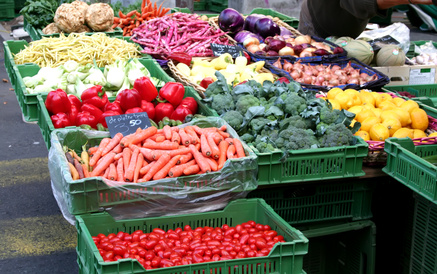
by Anna Rodriguez

Instagram stories about flashy but complicated healthy dishes might make us think that eating healthy shall take a big tall in our time and energy. In the meantime, advertisements for expensive so-called healthy brands take care of making us think that a healthy meal is expensive too.
As many beliefs that attach us to old unhealthy habits, none of both ideas are true. It is indeed very easy to eat good food without emptying our pockets and it can be a lot of fun too. You only need to follow a few steps and they will become a habit before you notice and you won’t believe you did not try these hacks before.
Please note that with eating healthy we don’t mean to strictly buy organic labeled products but to choose the right type of products as a system. Hereby five useful tips, you can take them all, but if you take only one, this will already have a great impact on your diet and expenses!
1) Make a No Go List
If you want to eat healthy, you first need to make a compromise with yourself about skipping some ingredients which we know are bad for our body. If we systematically skip a whole section of products, we save a lot of time and effort in our grocery activities (and we can use that time for cooking good things, which is much more fun!). Which are the sections we will skip?
- Unhealthy ultra-processed snacks (such as chips, salted fried nuts, anything that is in that section in a shiny noisy metalized bag).
- All pre-made sauces (cheese sauce, nachos sauce, even salad sauce).
- Any sweets section in the supermarket. Also hidden behind colorful packages, with cookies, donuts, crackers, etc.
- All ultra-processed meat (such as sausages, nuggets, etc).
- Sugarised cereals in the breakfast section.
- All pre-made meals. We better cook them at home!
With all this out of the picture, there is a big part of the supermarket we don’t need to walk through or look at. It sounds like a lot, but by deleting complete sections, you will make it way easier. You just forget about them. If you think this is kind of strict, then just honestly ask yourself if it contains high amounts of sugar, of fat, of salt or if it is ultra-processed. You will reach similar results.
2) Make a Meal Plan
Planning what to eat is another great hack, especially if you are single, as not having the family routine gives more space to get chaotic. Plan your meals according to your taste and desire (dishes you like to eat). Plan according to your time budget.
If you know on a certain day of the week you work until late, then you shall plan something that does not require much time and energy in the kitchen, while you can allow some more time for a slow recipe on your free leisure afternoons (if you actually enjoy cooking).
Plan according to your energy demand. This means that you shall plan more caloric meals for your exercise days and low carb meals for the easy days. If the whole family has different schedules and activities, you can make an average that suits everybody.
Plan your meals in a way that you use whole fresh products in one day or along a couple of days, this way you will produce less waste.
3) Make a Groceries List
Once you know what you like to eat, make the list of ingredients, dividing by veggies, meat, dairy, etc. To sum up, the list is according to each section in the supermarket.
Once at the grocery store you know what you are going to buy, stick to that plan and just forget anything else exists. Stay strong in the last part of the supermarket. They display the snacks and all the “guilty pleasures” that you want to avoid.
4) Stock Products When You Can Buy Them With a Discount
Stay updated about the promotions, sales, and discounts in the local stores. This is easy to do if you subscribe to the newsletters of the shops nearby you. That a product is in on sale does not mean that you have to buy it, not at all!
You shall always stick to the products that are in your grocery list and you buy more of those that are on a discount. Please consider that you shall buy extra only if you can store the product either because it’s dry such as pasta or rice, or because it can be preserved for a long time long such as oil or vinegar.
If it’s a fresh product, such as meat or veggies, consider if you can store it in the freezer or processed at home (if you can make a jam in the case of fruits). If this is not the case, you buy only what you need, otherwise, you will end up spending too much on products you will throw away.
5) Eat Seasonal Fruits and Vegetables
If you like to eat healthy, probably a big part of your diet will consist of fruits and vegetables, even if you are an omnivore. The best way to cut expenses in fruits and vegetables is to buy them when they are in season.
This can make a little twist to your diet and recipes, making your cooking time much more fun. It’s very easy to know when is the season of the most popular products by looking them up online. You can also buy extra of those products you know you can store. You can leave pieces of almost any summer fruit in your freezer to make the most delicious smoothies out of the season or you can prepare several jams that you will enjoy the whole year-round.
(Anna Rodriguez is a teacher, freelancer and a gardener. Gardening is the ultimate relaxation for her. She learned to eat the beautiful products seasonally she gets from her small garden, and she slowly adapted back to the local food cycle rhythm. She decided to spread the voice and invite other mothers to do the same and embrace this delicious, fun, and nutritious practice.)





You put the limelight on very simple but amazing things that actually works. Thank you for sharing this.